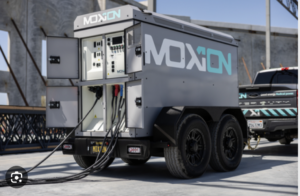4:53PM EDT October 2. 2012 – Just when it looked like the “hydrogen highway” had taken a permanent detour, automakers are once again feeling lighter than air about prospects for the fuel.
Nissan became the latest last week to say it is ready to mass-produce cars powered by hydrogen fuel cells. Honda, Toyota and Hyundai say they will have fuel-cell cars — which create electricity on board to power the car — ready to go on sale by 2015.
It marks a big turnabout for a fuel that got pushed aside after lots of hubbub last decade — despite being so non-polluting that tailpipes emit only water vapor. After touting new fuel-cell powered cars at auto shows, automakers stopped talking about hydrogen as they focused instead on plug-in electric cars.
Now, with many consumers appearing disinterested in plug-in battery cars as being too expensive and having too little range, hydrogen is back in favor.
Automakers have been finding ways to cut fuel-cell costs and to make longer-range hydrogen tanks, and as they have, along came another unexpected boost: America’s huge supply of natural gas. At present, almost all hydrogen used in cars is made by separating molecules in natural gas, and the shale boom has created huge reserves in the U.S.
As a result, automakers have made a series of fresh announcements regarding fuel-cell plans. Among them:
- Nissan. The TeRRA, a hydrogen fuel-cell powered SUV, was introduced last week at the Paris Motor Show. While it’s just a concept, Nissan executive Andy Palmer noted that fuel-cell costs are now a sixth of the predecessor concept and that automakers now can mass-produce them “whenever hydrogen becomes widely available” for consumers. It’s not, at least in the U.S.
- Honda. CEO Takanobu Ito just announced that Honda will launch a new fuel-cell electric car in the U.S. and Europe starting in 2015. It will “showcase further technological advancement and significant cost reduction.” Honda has already been letting consumers test its fleet of FCX Clarity hydrogen fuel-cell cars for a couple of years.
- Toyota. Japan’s largest automaker also plans a fuel-cell sedan in 2015. Vice Chairman Takeshi Uchiyamada touted the potential of hydrogen recently and dismissed plug-in electric vehicles as not being able to meet “society’s needs” for range, cost or recharge time.
- Mercedes-Benz. The German luxury brand is fielding a fleet of “F-Cell” vehicles in the U.S. Forty are being driven by customers now, with another 20 on the way. They lease for $599 a month for three years — including fuel.
- Hyundai, Kia. South Korean corporate cousins Hyundai and Kia will have a hydrogen-powered car in 2015, says John Krafcik, CEO of Hyundai Motor America. Don’t get too fired up, he says. He believes hydrogen shows little promise of replacing gasoline anytime soon.
Interestingly, General Motors, a leader in hydrogen fuel-cell research and in publicizing its test fleet a few years ago, has yet to commit to a new vehicle. GM still has most of the 119 converted Chevrolet Equinox crossovers on the road from its previous hydrogen fuel-cell effort.
Trying to make hydrogen fuel-cell vehicles affordable remains “a very challenging business case going forward,” says Charlie Freese, director of GM’s global fuel-cell efforts.
Plus, he points out, there still are few fueling stations. Even in hydrogen-promoting California, the Hydrogen Highway never really got built. You “can’t put volumes of cars out there when you have no way to fuel them,” Freese says.


 Moxion and NUE
Moxion and NUE